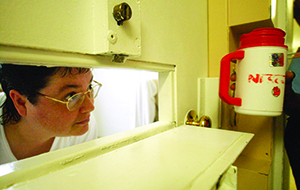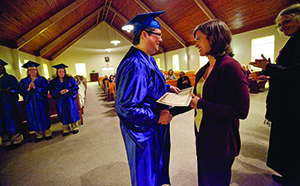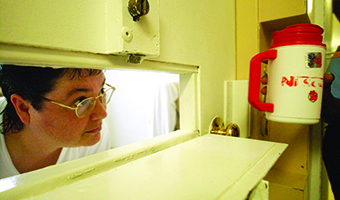Editor’s note: At presstime, Kelly Gissendaner’s fate was still undetermined. In 1998 she received the death penalty for persuading her boyfriend to murder her husband. If executed, Gissendaner would become the first woman in 70 years to be put to death in Georgia. The boyfriend, Gregory Owen, will be eligible for parole in eight years due to a plea bargain. In 2010, Jennifer McBride, now a professor at ELCA-affiliated Wartburg College, Waverly, Iowa, was one of Gissendaner’s teachers in an Atlanta prison theological program. McBride became an advocate and leading activist to grant Gissendaner clemency and commute her sentence to life in prison.

Kelly Gissendaner, the only woman on Georiga’s death row, peers through the slot in her cell door as a guard brings her a cup of ice. Gissendaner has in recent years undergone what writer Jennifer M. McBride calls a “significant transformation,” partly due to her involvement in an academic theology program.
Lutherans have the tagline “God’s work. Our hands.” to propel Christians into action. The phrase holds together a paradox and a tension. The work is God’s — God’s initiative, God’s dynamic movement, God’s power. Yet it demands human participation. Too often we view our participation as mere invitation instead of divine command, and so we’re tempted toward passivity and pessimism about our capacity to make real change.
Addressing the tension between divine and human action, German theologian Dietrich Bonhoeffer wrote from prison “that being Christian” demands two things: “prayer and the doing of justice.” In an essay in which he reflects on a decade of resistance to the Nazi regime, he wrote: “I believe that God is no timeless fate, but that he waits for and answers sincere prayers and responsible action.”
This tension consumed me in the final weeks of winter earlier this year. I knew the call from Kelly Gissendaner’s lawyers would come sometime in February telling me that their client received her death warrant. That call would include the precise date of the execution, which was set for two weeks later, Feb. 25.
My friendship with Gissendaner, the only woman on Georgia’s death row, began when she was a student in an academic theology program in the prison, sponsored by four Atlanta area seminaries. By the time I met her, she had already undergone a significant transformation, as expressed best in her clemency confession:

Gissendaner and McBride, a professor at Wartburg College, Waverly, Iowa, who taught Gissendaner through an Atlanta prison theological program and helped connect her German Lutheran theologian Jurgen Moltmann.
“It is impossible to put into words the overwhelming sorrow and remorse I feel for my involvement in the murder of my husband, Douglas Gissendaner. There is just no way to capture the depth of my sorrow and regret. I would change everything if I could. I will never understand how I let myself fall into such evil, but I have learned firsthand that no one, not even me, is beyond redemption through God’s grace and mercy.”
The fruit of Gissendaner’s transformation is seen through reconciliation with her children, ministry to despairing inmates whom no one else can reach, counsel to troubled youth and daily encouragement to others.
Through the theology program, she continued to cultivate fruit. She discovered her authentic theological voice, began a pen pal friendship with German Lutheran theologian Jürgen Moltmann, and gained a sense of hope and purpose she hadn’t previously known.
In her 2011 graduation speech, Gissendaner said: “From the start of the theology class I felt this hunger. I became so hungry for theology and what all the classes had to offer.”
Six months into the program, a new administration prohibited her from attending class. She recounted this about her theology education:
“Since I couldn’t go to theology class … the instructors came to me. … That gate was meant to keep everyone and everything separated from me. But that gate couldn’t keep out the knowledge that I was so hungry for, nor friendship and community. And it sure couldn’t keep out God. … Hope is still alive despite a gate or guillotine hovering over my head. … I have the capacity and unstoppable desire to accomplish something positive and to have a lasting impact.
“Even prison cannot erase my hope and conviction that the future is not settled for me or anyone. I have placed my hope in the God I now know. I rely on the steadfast and never-ending love of God.”
Execution day
I was with Gissendaner on the scheduled execution day when the news came that her clemency was denied. It’s the closest I’ve come to the powers of evil and death, and I wasn’t sure I could find my way out of the despair.
But earlier that morning, the execution scheduled for that night had been postponed for five days because of the possibility of snow. With this gift of time, a new resolve welled up within me, a determination that Gissendaner’s execution would not happen in silence, behind closed doors, without the world watching.
I didn’t necessarily think her life could be saved, except by her lawyers who were working around the clock. But I did think her story could be told. We could raise her voice, demanding that her life be witnessed and that this execution be condemned.
Without much of a plan, I reached out to a colleague at The New York Times, simply wondering if the theology certificate and story of Moltmann’s friendship might be of interest for his weekly religion piece.
As I did so, I noticed Facebook and cellphone messages from a few close friends. A group of about 15, all of whom were connected in various ways to the prison theology program, were already gathering to plan the next steps — faculty, theology instructors, pastors and priests, doctoral students and seminarians, and a former inmate who credits Gissendaner with her own transformation.
That night in the living room of a dear friend, the #kellyonmymind campaign was born.
In that living room we met every night to devise a course of action. Within a day or two, The New York Times piece was out, getting picked up by other media outlets from CNN and the Washington Post to Fox News and the Christian Broadcasting Network. Kelly’s story was impacting Christians across the political divide, pushing the logic of Christian faith to its outermost limits, pressing us to re-examine and reaffirm the truths we proclaim about repentance, forgiveness, redemption and hope.
In five short days leading up to the scheduled execution, we launched a major social media campaign reaching more than 4 million people, wrote for Huffington Post and CNN.com, gathered letters from religion scholars around the world who advocated for their fellow theologian, started petitions and delivered more than 80,000 signatures to the governor’s office.
We mapped out talking points, made phone calls, published news releases, held a news conference at the Georgia Capitol, produced short documentaries, hosted a prayer vigil and sparked others in seminaries across the country, and responded to numerous local and national interview requests.
The movement happened so quickly we could barely keep up.
Casting aside our day jobs as much as we could, we threw ourselves into the work, every concrete act arousing passion for the possible and throwing open the future. This was our participation in God’s redemptive movement, already revealing itself in threats of snow. This was, in the words of Martin Luther King Jr., our “fanatic resistance” to evil and death.
Telling Kelly’s story
We told Gissendaner’s story everywhere and every way we could.
“As long as Kelly has breath, hope is still alive,” one documentary proclaimed. “So we must act while there is still time. Tell [Georgia Gov. Nathan] Deal he does have the power to halt this execution. Tell Georgia’s Board of Pardons and Parole that there is still time to reverse their decision.”
The execution was rescheduled for March 2 at 7 p.m., but as often happens there were several delays as we waited for the Supreme Court to rule on appeals to the higher courts. Hours later, those last-minute appeals were denied. More hours passed and finally we heard that there might be a complication with the lethal injection.
Information was spotty, until finally, close to 11 p.m., the Department of Corrections issued a last-minute postponement due to an unidentified problem with the compounded drug. It appeared to be “cloudy.” All planned executions in Georgia were temporarily postponed and would resume once the analysis of the drugs was complete.
Months later, as we await another death warrant, someone close to Gissendaner’s case told me: “The more I’ve thought about it, the more convinced I’ve become that Kelly’s life was saved that night because of the work you all did to make sure the world was watching. The Department of Corrections didn’t have to stop that execution on account of the drugs.”
On Good Friday, I walked across the prison compound with one of the women in the theology program, who told me that the delay of Gissendaner’s execution reawakened her faith and gave her back her strength. “It had been so long since I had seen God move,” she told me.
Still reeling from the experience just a few weeks before, I asked — more for me than for her — “What if the worst still happens? How will that affect your faith?”
She responded: “I’ve thought about that a lot. All I can say is that I needed to know that God is still moving. Now I know.”



